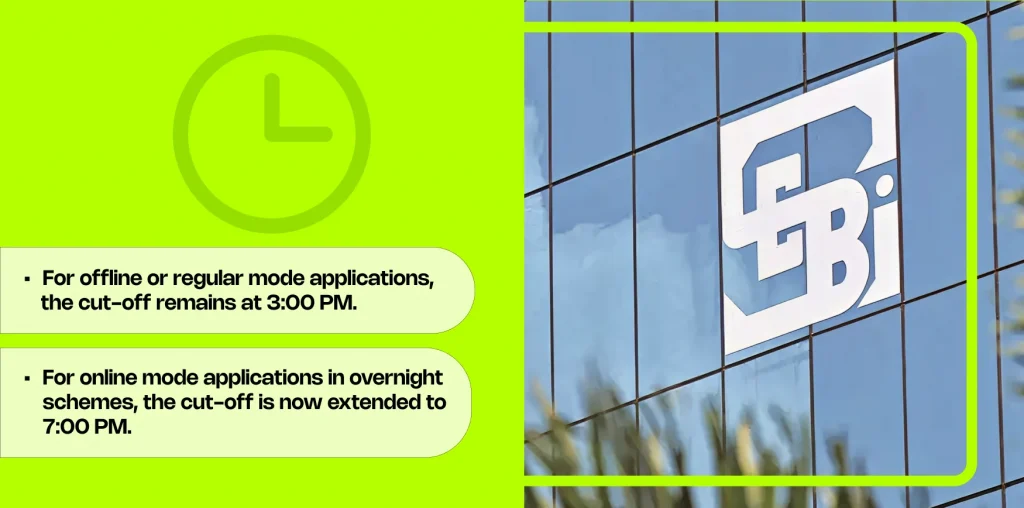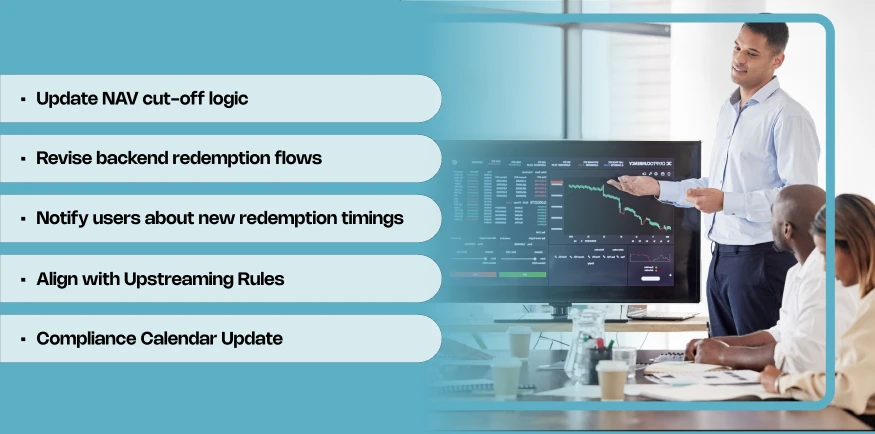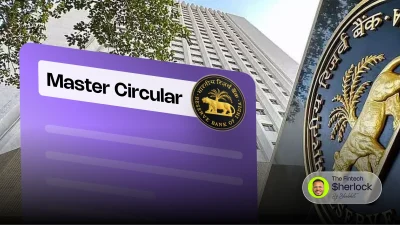SEBI has updated the cut-off timings to determine the Net Asset Value (NAV) for redemptions in Overnight Mutual Fund Schemes (MFOS). Now, applications made till 3 PM will get the NAV of the day before the next business day, and online applications can be made till 7 PM. This aligns redemption timing with broker operations and ensures smoother upstreaming of client funds. Effective June 1, 2025.
Why SEBI Had to Intervene
In recent years, SEBI has tightened controls around the movement and safeguarding of client funds by brokers and clearing members. The December 2023 upstreaming circular mandated that brokers place clients’ funds only with Clearing Corporations (CCs) at the end of the day. These funds can be in the form of cash, fixed deposit liens, or overnight mutual fund units pledged with CCs.
But here’s the friction: brokers often found it difficult to unpledge mutual fund units and place redemption requests after market hours. The timing mismatch created operational bottlenecks. To solve this, SEBI’s latest circular (dated April 22, 2025) modifies NAV cut-off timings to better align with this upstreaming process and streamline client fund management.
Why This Change?
Stock brokers and clearing members (CMs) encountered a recurring operational issue when managing client funds invested in Mutual Fund Overnight Schemes (MFOS). Specifically, they had a very limited window after market hours to unpledge these units and place redemption requests. Given the regulatory requirement to upstream client funds to Clearing Corporations (CCs) daily, this created timing pressures.
SEBI’s updated NAV timing framework addresses this challenge by extending the operational window:

- For offline or regular mode applications, the cut-off remains at 3:00 PM.
- For online mode applications in overnight schemes, the cut-off is now extended to 7:00 PM.
This change provides stock brokers with additional flexibility to process redemptions after market close and align better with end-of-day compliance timelines. For fintech platforms offering APIs or mutual fund infrastructure, this reduces the risk of failed or delayed redemption requests and simplifies reconciliation processes.
Clarification on Fund Management by Schemes
Overnight mutual funds operate differently from traditional schemes. These funds primarily invest in government-backed instruments with a maturity of one day, such as Tri-party Repos (TREPS) and government securities.
When redemption requests are received, fund managers are not required to liquidate holdings. Instead, they can simply refrain from reinvesting the matured funds for the next day. This ensures liquidity is preserved, and fund obligations can be met without any market transaction. Therefore, the extension of the NAV cut-off time does not impact the fund’s redemption capacity or valuation consistency.
Demat and Pledge Mandate for Brokers
To ensure transparency and safeguard client interests, SEBI mandates that any investment of client funds by brokers in MFOS must adhere to the following conditions:
- The mutual fund units must be held in dematerialised (demat) form.
- These units must be pledged to a Clearing Corporation at all times.
This framework ensures that client funds are both traceable and protected, even in adverse scenarios involving broker defaults.
Background: SEBI’s December 2023 Upstreaming Circular
The upstreaming circular issued in December 2023 requires brokers and CMs to place all client clear credit balances with CCs at the end of each trading day. SEBI specified three permissible instruments for this purpose:
- Cash
- Fixed Deposit Receipts (FDRs) with lien
- Units of Mutual Fund Overnight Schemes (MFOS)
Given the practical limitations of using cash or FDRs at scale, MFOS emerged as a preferred instrument. However, the existing NAV timing created operational friction in redeeming or switching these investments after market hours. Hence, the timing adjustment became necessary to align regulatory compliance with real-world broker workflows.
Public Consultation and Regulatory Process
This change was not introduced unilaterally. A working group comprising representatives from the Association of Mutual Funds in India (AMFI), industry participants, and SEBI’s Mutual Funds Advisory Committee (MFAC) was constituted to evaluate the issue.
Their recommendations were then published for public feedback. Based on the responses received and further analysis, SEBI finalised the updated framework. This process ensured that the final circular reflected industry realities and incorporated practical feedback.
Effective Date
The new NAV timing rules for overnight mutual fund schemes will start from June 1, 2025.
That means mutual funds, asset managers, brokerages, and fintech platforms need to get their systems ready ahead of time. Whether it’s updating your backend logic, adjusting your redemption workflows, or just making sure your customers know about the change – the clock is ticking.
Why Fintechs Should Pay Attention
At first glance, this might look like a small backend tweak for mutual funds. But if you’re in the business of investment platforms, capital markets infra, or API-driven broking services, this change matters.
The extended cut-off window affects how you process redemptions, calculate NAVs, and communicate fund activity to users. If your systems don’t reflect the new timings, you risk delays, failed redemptions, or even compliance issues.
In short: this is one of those regulatory changes that lives quietly in the background – but if you miss it, your users will notice.
✅ What Fintechs Should Do Now

1. Update NAV Timing Logic:
- If your platform displays mutual fund cut-off logic, especially for overnight schemes, revise it:
- 3 PM cut-off for regular
- 7 PM cut-off for online
- 3 PM cut-off for regular
2. Adjust Backend Redemption Logic:
- APIs calculating NAV allocation or user dashboard summaries need updates to reflect the new redemption NAV timings.
3. Communicate Changes to Users:
- If your platform allows MFOS investments or acts as an RIA distributor, notify users about the revised timing for redemption requests.
4. Align with Upstreaming Rules:
- If you’re a broker or B2B fintech dealing with brokers, make sure client funds used for overnight funds are:
- Invested only in government repo-linked schemes
- In demat format
- Pledged to a CC
- Invested only in government repo-linked schemes
5. Compliance Calendar Update:
- Mark June 1, 2025 as the go-live date for product and compliance changes. Internal testing should finish by May-end.
Engineering/Product Implications
• Backend services handling NAV mapping or MF redemptions will need minor rework.
• If relying on AMFI NAV APIs, confirm support for the new logic post-3 PM and post-7 PM.
• Time-based CRON jobs and fund cutoff automation must reflect this change.
Legal & Compliance Teams
• Confirm scheme eligibility for overnight investments (must be risk-free repo-based).
• Ensure demat format and pledge verification with CCs is tracked.
• Document updated workflows to reflect this operational change in compliance manuals.
Conclusion
SEBI’s tweak to NAV cut-off timing might seem like a technical footnote, but it’s a thoughtful fix to a real market friction. As brokers become custodians of upstreamed client funds, Overnight Mutual Funds serve as a low-risk parking avenue. The extended cut-off helps ensure seamless redemption without liquidity stress.
For fintech platforms in the broking, investment, or infra layer, this is a heads-up to fine-tune your systems, update your product flows, and communicate clearly with users.
More importantly, this is yet another sign of SEBI’s intent to de-risk India’s capital markets, streamline fund flows, and maintain operational hygiene – all of which fintechs must embrace in both spirit and code.
For fintech platforms in the broking, investment, or infra layer – this is a heads-up to fine-tune your systems, update your product flows, and communicate clearly with users.
More importantly, this is yet another sign of SEBI’s intent to de-risk India’s capital markets, streamline fund flows, and maintain operational hygiene – all of which fintechs must embrace in both spirit and code.
Need help aligning this with your internal systems or compliance processes?
Contact BeFiSc – our experts can help you decode the circular, redesign workflows, and stay audit-ready with minimal effort.




